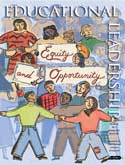In “September 11: Seven Lessons for Schools” (October 2002 issue of Educational Leadership), Diane Ravitch writes, “In the wake of Sept. 11, U.S. education has begun to absorb seven important lessons.” She cites no evidence for this assertion, and I hope she is wrong. The lessons that she identifies offer a highly politicized and distorted view of education goals, American values, and world events.
The first lesson, according to Ravitch, is that “It's okay to be patriotic.” She blames the Vietnam War for giving “patriotism a bad name.” In fact, it was government secrecy, lies to the public, and illegal activity by elected officials that gave patriotism a bad name in the United States. Ravitch confuses the need to promote active citizenship in a democratic society with patriotism. Active citizenship requires critical thinking and the constant questioning of authority. It never provides government officials with a blank check. Patriotism, on the other hand, means blindly rooting for the home team. This fervor may be acceptable at sporting events, but not as a substitute for civic discourse.
Lessons two and three remind readers that “not all cultures share our regard for equality and human rights” and that although the United States represents good, some people are “evil.” I would rather students learn that the world is a complex place, that it is not always easy to assign blame, and that no one has the monopoly on truth and righteousness. The United States enslaved African Americans until 1865 and had legal racial segregation until the 1960s. The United States remains the only country to have used nuclear weapons. Not only did it drop two bombs on civilian populations, but it also experimented with the after-effects of radiation on its own military personnel. In recent years it has supported death squads and armed dictatorial regimes around the world, including the government of Saddam Hussein in the 1980s.
Although Ravitch concedes that “pluralism and divergence of opinion are valuable” and that students must learn to “respect differences of opinion,” I do not believe that she sets a good model. In an essay published in Education Week on Oct. 17, 2001, Ravitch accused unnamed “educators” of wanting to teach children to “tolerate those who hijack commercial jetliners and kill innocent victims.” She singled out proponents of multiculturalism, charging them with teaching “cultural relativism” and with responding to the attacks on the World Trade Center and the Pentagon with a “blame-the-victim approach.” She did not offer any citations to support her position.
The main thrust of Ravitch's lessons is that American students will have a better understanding of contemporary world affairs if they have a deeper knowledge of U.S. and world history. I agree with her here. The question is, What exactly should they be taught? That the United States is always the “good guy” and that God is on our side? When the National Center for History in Schools released the U.S. and world history standards in 1994, the standards became a lightning rod for conservative discontent with public education, multiculturalism, immigration, ethnic identity movements, a declining U.S. economy, and “eroding family values.” The standards were widely denounced in the popular media; a columnist for U.S. News and World Report charged that they placed “Western civilization . . . on a par with the Kush and the Carthaginians,” and the standards were overwhelmingly rejected by the U.S. Senate (Singer, 1997).
What version of recent history will patriotic public school textbooks present? In the second half of the 20th century, the United States either openly or covertly intervened in inter-Arab politics on a number of occasions. These interventions included supporting Lebanon and Jordan against Nasser's Egypt; the Shah's Iran against Iraq; Iraq against Khomeini's Iran; Kuwait against Iraq; Saudi Arabia against Nasser's Egypt and Saddam's Iraq; North Yemen against South Yemen; Egypt against Libya; Morocco against Algeria; and Israel against all other regional states (Fuller & Lesser, 1995).
The final lesson is that “we must teach students to appreciate and defend our democratic institutions.” Once again, I agree with her on the general goal; the problem is in the details. Ravitch believes that the attack on Sept. 11, 2001, was “a challenge to the fundamentals of American liberal democracy.” But there are other legitimate ways to view it. A number of scholars have discussed unrest in the Middle East as a response to unfettered economic globalization that has impoverished much of the globe and destroyed traditional societies (Barber, 2000; Zinn & Arnove, 2002). Economic exploitation has often been coupled with the use of U.S. military force to support pro-Western dictatorships that suppress political democracy and religious expression. A number of these regimes—including Saudi Arabia, Egypt, and Pakistan—are in the Islamic world.
Diane Ravitch concludes that as a result of the events of Sept. 11, 2001, schools must teach students that they are citizens of the United States, not citizens of the world. In many ways, this is Ravitch's most dangerous recommendation. War, poverty, disease, pollution, global warming, and multinational corporations know no national boundaries. Americans must realize this before the damage to the world has become irreparable.
Ravitch Replies
Yes, it is OK to love your country. Loving your country does not mean blind obedience or ignorant jingoism, but informed appreciation for our nation's pluralistic and democratic values. Yes, it is important to understand that there are people in the world who are evil, as Stalin and Hitler were evil, as the 9/11 hijackers were evil, as are all those who wantonly murder and deny basic human rights. Yes, we must teach students to understand and defend our democratic institutions. And, yes, our students are mainly citizens of the United States (or hope to be), where they will vote, serve on juries, and take part in community affairs.
Since Sept. 11, the world has changed in profound ways. Most Americans now understand that our values of racial and gender equality and our commitment to religious tolerance are not universally shared. This understanding does not imply that our nation is perfect or that it was perfect in the past. It does suggest, however, that we can take pride in our democratic values and institutions and teach our children how hard it was to establish these values and institutions. We do so not because of chauvinism but to preserve these values and institutions for future generations.
These statements seem fairly obvious, almost commonsensical. To most teachers, they are not controversial. Some in the academic world continue to see the United States as the enemy. I do not agree, nor do most Americans.

